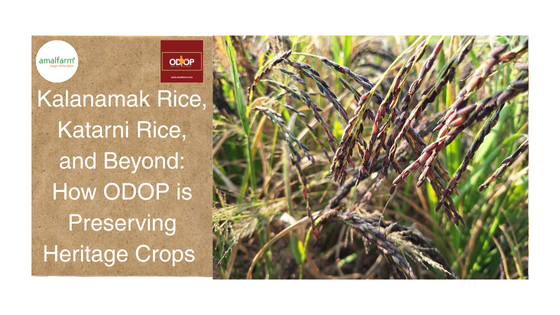Copyright © 2023 Amalfarm. All Rights Reserved.


India’s agricultural legacy is as diverse as its culture, with every region nurturing crops that tell a story of tradition, taste, and time. However, modernization and commercial farming have pushed many of these heritage crops to the brink of extinction. That’s where the One District One Product (ODOP) initiative steps in as a game-changer.
With focused efforts to spotlight region-specific crops like Kalanamak Rice from Uttar Pradesh and Katarni Rice from Bihar, ODOP is reviving age-old agricultural treasures and empowering local farmers. By combining traditional wisdom with modern market access, this initiative ensures these crops don’t just survive—they thrive. ODOP is not just preserving food—it’s preserving culture, livelihoods, and India’s agrarian identity, one district at a time.

The One District One Product (ODOP) initiative is a flagship program by the Government of India designed to foster balanced regional development and unlock the economic potential of every district. By selecting, branding, and promoting one unique product per district, ODOP uplifts local artisans, farmers, and producers while reviving traditional knowledge systems.
With 1102 products identified from 761 districts, the initiative taps into existing local ecosystems and highlights GI-tagged and export-worthy products. From Lakadong Turmeric in Meghalaya to Kashmiri Walnuts in Budgam, ODOP is actively connecting regional treasures to national and global markets.
Events like the Mango Festival of India in Japan and textile buyer-seller meets in Russia showcase the global push. Whether it’s building capacity at the grassroots or organizing mega trade events, ODOP is transforming India’s local specialties into international sensations—fueling rural economies and preserving our rich cultural heritage at the same time.

Kalanamak Rice, cultivated in Siddharthnagar and surrounding districts of eastern Uttar Pradesh, is a centuries-old aromatic variety known for its black husk, rich taste, and high palatability. Its name comes from “kala” (black) and “namak” (salt), and it holds historical roots dating back to the Buddhist period (600 BC). Celebrated by the FAO as a global specialty rice, it received the GI tag in 2013.
Under the ODOP scheme, the government has established Common Facility Centres and is promoting this rice through incentives, branding, and research support. Siddharthnagar even won the PM’s Excellence Award (2021) for its efforts. Amalfarm proudly brings this heritage grain from its true origin—connecting you with purity, tradition, and unmatched flavour.

Treasure Katarni Rice, native to the Bhagalpur and Banka regions of Bihar, is cherished for its rich aroma, delicate texture, and subtle nutty flavor. Once a royal favorite, this heirloom variety has faced decline due to low yield, lack of awareness, and limited market access. However, under the ODOP initiative, efforts are underway to revive its legacy through farmer training, improved packaging, branding, and promotional support.
By spotlighting Katarni as Bhagalpur’s flagship product, ODOP is helping farmers get better returns while preserving a cherished part of Bihar’s agricultural heritage. Amalfarm celebrates this fragrant gem straight from its source to your plate.

The ODOP initiative has become a powerful catalyst for rural transformation by boosting farmers’ incomes and minimizing their reliance on middlemen. With direct market access, better branding, and government-backed support, farmers now earn fair prices for their unique produce. This shift not only strengthens local economies but also revives traditional farming techniques and promotes organic, sustainable cultivation.
ODOP celebrates regional pride—encouraging communities to preserve their agricultural heritage. Across India, success stories are emerging—like Kalanamak rice farmers in Siddharthnagar or Katarni cultivators in Bhagalpur—who’ve seen improved livelihoods and national recognition. Amalfarm stands with this mission, ensuring that every grain you enjoy supports the hands that grow it, preserving both culture and craftsmanship.

While the ODOP initiative has made remarkable strides, sustaining long-term momentum poses challenges. Continued funding, infrastructure development, and consistent policy support are crucial. Many products still lack strong branding, modern packaging, and global outreach, which limits their market potential. Building robust supply chains and ensuring quality control are also pressing needs. To truly unlock the potential of regional treasures, collaborative efforts between government, private players, and local producers are essential. Looking ahead, the government plans to expand ODOP’s scope, integrate it with e-commerce platforms, and promote products on international stages, making India’s local icons global sensations.

At Amalfarm, we’re proud to align with ODOP’s vision by sourcing authentic, GI-tag, minimally processed products directly from farmers—preserving tradition while delivering purity and nutrition to every household.
The ODOP initiative is reigniting pride in India’s agricultural roots by reviving heritage crops and empowering farmers. By choosing local, traditional products, consumers become part of this transformative journey. Supporting sustainable farming not only uplifts rural livelihoods but also safeguards India’s rich biodiversity for future generations.
Have a question?
